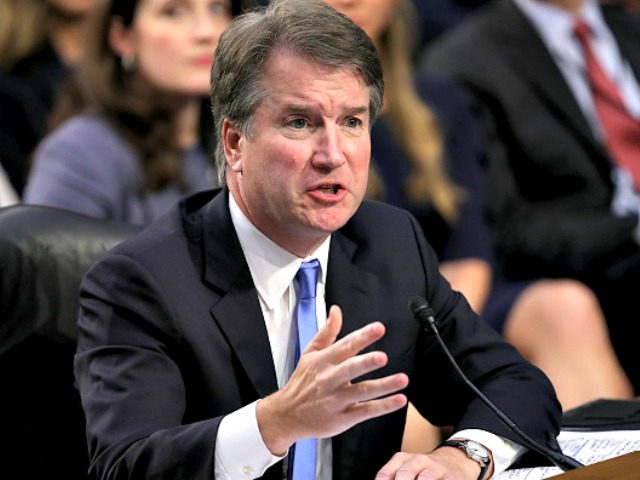Judge Brett Kavanaugh laid out his philosophy on one of the most prominent legal issues of his long career, the role of the “administrative state,” in his questioning by Sen. Orrin Hatch (R-UT) at the Senate Judiciary Committee’s hearing on his nomination to the Supreme Court Tuesday.
The expansive role of the so-called “fourth branch” of the federal government, the massive unelected bureaucracy of the federal executive agencies who actually make and implement most of the policy and regulations in the country, has been one of main focuses of Kavanaugh’s academic writings.
As a judge of the U.S. Court of Appeals for the District of Columbia Circuit, the main court that handles administrative law cases, Kavanaugh has also played a prominent role in shaping the legal regime in which this fourth branch operates for more than a decade. With an administration that ran on draining the Washington “swamp” in the White House, Kavanaugh’s potential to rein in the expansive power of the agencies has been one of the main hopes of his supporters within the conservative legal community.
“The accumulation of all power in one body would be the very definition of tyranny,” Kavanaugh paraphrased The Federalist #47 to Hatch when ask about the power of the agencies, which conservative scholars have long seen as a transfer of power from the legislative to the executive branch. “Separation of powers protects individual liberty. It does so because Congress can pass the laws, but you can’t enforce the laws.”
Hatch’s questions focused on the so-called Chevron Deference, named after 1984’s Chevron v. Natural Resources Defense Council, one of the most influential administrative law cases of all time. Under the Chevron Deference, which Kavanaugh has expressed skepticism about, federal agencies are allowed to effectively implement new policy and take actions if Congress has not “directly spoken to the precise question” and the new policy “is based on a permissible construction” of existing law.
“What often happens, or too often I’ve seen, is that the executive branch then relies on the old law as a source of authority to do this new thing,” Kavanaugh explained to Hatch. “And what they try to say, ‘Well, the old law is ambiguous, so we can fit this new policy into the old law,’ as justification for doing this new thing.”
“I’ve seen this in national security cases, I’ve seen it environmental cases, you see it all over the place. It’s a natural phenomenon because the executive branch wants to implement what it thinks is good policy,” Kavanaugh said, condensing the numerous administrative law cases on which he has ruled as a D.C. Circuit judge. “Now, when those cases come to court, it’s our job to figure out whether the executive branch has acted within the authority given to it by Congress.”
Kavanaugh then gave Hatch an articulation of his philosophy on administrative law:
My administrative law jurisprudence is rooted in respect for Congress. Have you passed the law to give the authority. I’ve heard it said that I’m a skeptic of regulation. I am not a skeptic of regulation — at all. I am a skeptic of unauthorized regulation, of illegal regulation, of regulation that is outside the bounds of what the laws passed by Congress have said.
Should he be confirmed to the Supreme Court, Kavanaugh may find an ally in future decisions on the power of the executive agencies: President Donald Trump’s first Supreme Court appointee, Justice Neil Gorsuch. Like Kavanaugh, Gorsuch was noted throughout his legal career as a critic of expansive agency power. Liberal ex-senator Al Franken (D-MN) grilled Gorsuch on his potential threat to the power of the administrative state in his confirmation hearings last year, suggesting it was part of wider right-wing plot against government power.
At a Federalist Society gala in November, Gorsuch mocked the notion that “anti-administrivism” had been ruled out in the 1930s during President Franklin Roosevelt’s New Deal era. “That’s kinda funny,” Gorsuch joked at the time, “I thought the powers of our government were conclusively allocated in the 1780s.”

COMMENTS
Please let us know if you're having issues with commenting.